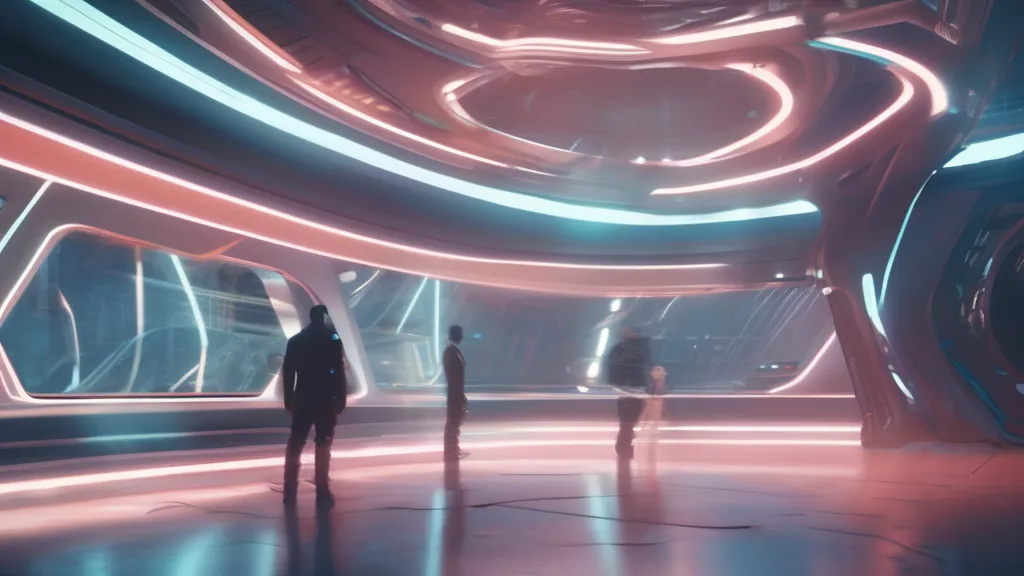The AI Revolution in Film: Netflix's Bold New Frontier
Exploring the Role of AI in Entertainment and Storytelling

- Netflix’s use of AI in ‘The Eternaut’ marks a significant milestone.
- AI offers unprecedented possibilities for enhancing creativity and efficiency.
- The integration of AI raises ethical and artistic concerns.
- The future of film is intertwined with advancements in artificial intelligence.
In the ever-evolving landscape of entertainment, Netflix has consistently been at the forefront of embracing new technologies to enhance storytelling. Recently, the streaming giant made headlines by quietly incorporating AI-generated content into one of its original series, ‘The Eternaut.’ This bold move has sparked a broader conversation about the role of artificial intelligence in filmmaking and what it means for the future of the industry.
The Scene That Changed Everything
During a recent earnings call, Netflix co-CEO Ted Sarandos revealed that a key scene depicting a building collapse in ‘The Eternaut’ was created using AI tools. This post-apocalyptic drama, set against the backdrop of an alien invasion in Argentina, presented unique challenges in terms of visual effects (VFX). Sarandos highlighted that the scene, completed with the help of AI, was produced “10 times faster” than using traditional VFX methods.
The decision to use AI was not merely a matter of convenience. According to Sarandos, the scene would have been prohibitively expensive to film using conventional techniques. Even if traditional VFX had been employed, it would have significantly extended the production timeline and budget.
But what makes this revelation particularly noteworthy is that viewers were unaware of the AI’s involvement until months after the show’s release. This subtle integration raises questions about transparency and the evolving role of AI in creative processes.
AI in Entertainment: A Double-Edged Sword
The integration of AI into filmmaking presents both opportunities and challenges. On the one hand, AI offers unprecedented possibilities for enhancing creativity and efficiency. By automating time-consuming tasks, AI can free up filmmakers to focus on storytelling and innovation. Tools like generative AI, which can create realistic environments and effects, are revolutionizing the way visual stories are told.
However, the use of AI also raises ethical and artistic concerns. One primary issue is the lack of transparency. In the case of ‘The Eternaut,’ viewers were not informed of the AI-generated content, sparking debate about the need for disclosure. As AI becomes more prevalent, should audiences be notified when it is used in a film or show?
Moreover, the reliance on AI could potentially impact employment in the industry. While AI can enhance productivity, it may also reduce the demand for certain roles, particularly in VFX and post-production. Yet, as Sarandos emphasized, AI should be seen as a tool that augments human creativity rather than replaces it.
The Broader Implications
Netflix’s experiment with AI is part of a larger trend in the entertainment industry. Companies are increasingly exploring how AI can be used to streamline production, personalize content recommendations, and even generate scripts. In fact, Netflix has already introduced AI-driven search features and generative AI ads, showcasing the technology’s versatility.
However, the integration of AI into creative processes is not without controversy. Some critics argue that over-reliance on AI could lead to homogenized content, lacking the nuance and originality that defines great storytelling. Others fear that AI could be used to manipulate or exploit audiences, raising concerns about privacy and ethics.
A Balanced Perspective
To understand the full impact of AI in film, it’s crucial to consider multiple perspectives. Proponents of AI argue that it democratizes filmmaking, making high-quality production accessible to a broader range of creators. By lowering costs and increasing efficiency, AI can enable independent filmmakers to compete with larger studios.
On the other hand, skeptics caution against unchecked adoption of AI in creative fields. They emphasize the importance of maintaining artistic integrity and ensuring that human creativity remains at the heart of storytelling. As filmmaker Christopher Nolan once said, “The essence of cinema is that it is a human experience.”
The Road Ahead
As AI continues to evolve, its role in the entertainment industry will likely expand. Filmmakers and studios must navigate the challenges and opportunities that come with this technological shift. It will be essential to strike a balance between embracing innovation and preserving the human touch that makes storytelling so powerful.
For viewers, this means being more discerning about the content they consume and aware of the technologies used in its creation. As AI becomes more integrated into film and television, audiences may need to reevaluate their expectations and definitions of authenticity.
Conclusion
Netflix’s use of AI in ‘The Eternaut’ marks a significant milestone in the evolution of filmmaking. While AI offers exciting possibilities for enhancing creativity and efficiency, it also presents challenges that must be thoughtfully addressed. As the industry continues to explore the potential of AI, it will be crucial to maintain transparency, uphold artistic integrity, and ensure that technology serves to enhance, not diminish, the human experience in storytelling.
The future of film is undoubtedly intertwined with the advancements in artificial intelligence. As viewers, creators, and industry leaders, we must engage in ongoing dialogue about the role of AI in entertainment and work collaboratively to shape a future that respects both innovation and tradition.
References
- Netflix’s AI-generated scene in ‘The Eternaut’
- Ted Sarandos’ earnings call
- Christopher Nolan on filmmaking
Call to Action How do you feel about AI’s role in entertainment? Should filmmakers disclose when AI is used in their productions? Share your thoughts in the comments below.